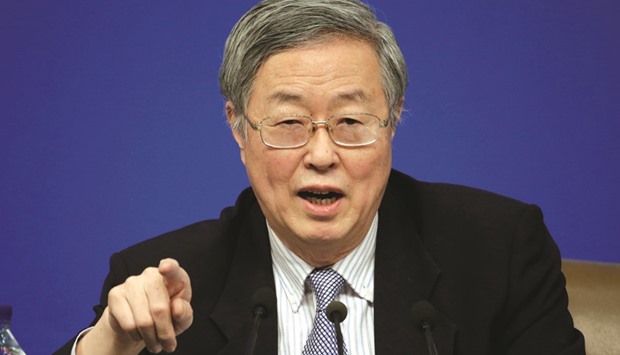Chinese central bank governor Zhou Xiaochuan said growth prospects have improved in the world’s second-largest economy, but its monetary policy remains prudent and neutral.
Earlier this week, China published upbeat data showing its economy got off to a strong start to 2017, supported by bank lending, a government infrastructure spree and a long-sought resurgence in private investment.
“China’s economic growth rate is stable overall, with growth prospects improving,” Zhou said, according to a post on the People’s Bank of China’s website yesterday.
“China will continue to implement active fiscal policy, and prudent and neutral monetary policy.” The People’s Bank of China (PBoC) on Thursday raised short-term interest rates for the third time in as many months, in what economists saw as a bid to curb capital outflows and keep the yuan currency stable after the Federal Reserve raised US interest rates this week. The PBoC has said specifically that Thursday’s action should not be seen as full-blown policy tightening like the Fed’s.
The Chinese central bank has left its benchmark lending rate unchanged since an October 2015 cut.
The government has promised to contain debt and property market risks in 2017 following years of credit-fuelled expansion.
Data yesterday showed China’s red-hot property market picked up pace in February after price gains had slowed in the previous four months.
Efforts will be made to contain debt levels, including restructuring of firms with heavy debt burdens, alongside a push to reduce excess industrial capacity, Zhou said in Beijing last week.
“In terms of macroeconomic policies, China is currently focused on structural adjustments to the economy and pushing forward supply-side reform,” Zhou said. He was speaking to other central bank governors and finance ministers from the major Brics emerging economies in Baden-Baden, Germany, during G20 meetings.
On Wednesday, the Fed raised interest rates for the third time since the global financial crisis in a widely anticipated move, and set the stage for roughly two more hikes this year as the US economy strengthens.
Central banks in Saudi Arabia, the United Arab Emirates, Kuwait and Bahrain tightened policies within 90 minutes of the Fed’s announcement.
Zhou met US Treasury Secretary Steven Mnuchin at the G20 meetings yesterday, the PBoC said on its website.

Zhou Xiaochuan, governor of the People’s Bank of China, attends a news conference in Beijing. China’s economic growth rate is stable overall, with growth prospects improving, Zhou said yesterday.


